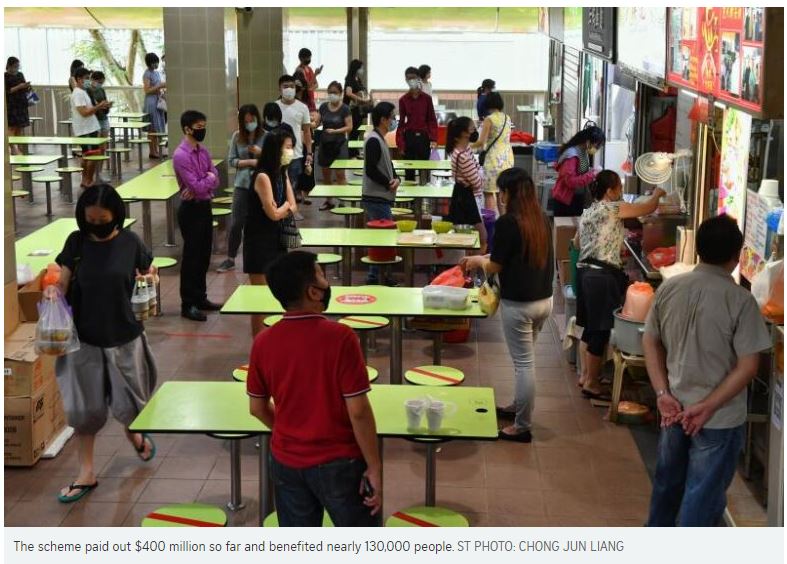Singapore: Around two in three income relief applications have been approved; some self-employed still unable to benefit
SINGAPORE – More than 60 per cent of the applications for the Self-Employed Person Income Relief Scheme (Sirs) processed by the National Trades Union Congress (NTUC) have been approved, the Ministry of Manpower (MOM) said on Monday (June 22).
It added that the vast majority of those who applied received the same payouts as auto-included recipients, after taking into account the “extenuating circumstances” faced by some self-employed people.
The scheme has paid out $400 million so far and benefited nearly 130,000 people, including 100,000 who auto-qualified.
The MOM and NTUC said they “exercised flexibility in assessing each case for its merits”.
The criterion, for example, which stipulates that a self-employed person must be living in a property with an annual value not exceeding $21,000 has been expanded to take into consideration those waiting to move into their HDB flat.
Tenants of a room rather than an entire unit can submit proof of their rental contracts for reassessment. They will get a Sirs payouts if the annual rent falls within the annual value criteria.
However, some people who live with their parents still find their situation to be in contention with the annual value criteria.
Creative producer Sharmila Yogalingam, 34, was notified that she will get three quarterly partial payouts of $2,400 each, as she lives in her parents’ private property, which has an annual value exceeding $21,000 .
The full payout disburses $9,000 in cash over nine months to eligible applicants.
“While I’m very grateful for any kind of financial help, I’m a bit disappointed that the criteria has to take into account the annual value of the property we live in,” said Ms Yogalingam.
“I have suffered from income loss as a result of the Covid-19 situation, in the same way as any other HDB-dwelling artist. Both of my parents have retired, so I’m financially supporting them as the sole breadwinner.”
Ms Yogalingam also noted that those who stay with relatives find it difficult to provide rental contracts, and suggested that the income of their dependants be taken into further consideration instead, particularly those who have retired parents.
Her job involves hiring freelancers such as stage managers and actors on project-based jobs across a range of media like theatre, Web shows and documentaries.
She has lost at least 95 per cent of her income compared with the same period last year.
“As artists, our pay comes in more irregularly, as it depends on when our gigs and projects are scheduled, so perhaps it would be helpful to look at our loss of income in terms of cancelled projects too, so that more self-employed people are able to benefit from this,” Ms Yogalingam added.
Mr Alvan Koh, a 41-year-old artisan carpenter, is also getting three quarterly partial payouts of $2,400 each as his spouse’s yearly assessable income is a little over $70,000.
He said: “I’m really grateful for this help during such a terrible period, so any amount is useful in keeping us afloat when income has hit zero in the past two to three months.
“The only improvement I wish for would be that the application process was more transparent and better executed. For instance, the explanation for the reduced amount should have come from the Government, and not through the grapevine that is Facebook.”
Mr Koh’s income has fallen by more than 60 per cent.
Some applicants faced challenges throughout the application process.
Freelance tutor and translator Rai Said, 45, felt her application was rejected because she had declared her income under the wrong category in the Notice of Assessment for the 2019/2020 tax year.
Income earned by the self-employed should be declared as trade income.
“It was my first time declaring my income as a self-employed person, so I wrongly declared it under the personal income category,” she said.
Ms Rai asked that her income be re-classified in the correct category and re-submitted her Sirs application but has been waiting for almost a month for it to be approved.
“Though my income has fallen by around 50 per cent, I’m fortunate to have some funds to stay afloat, but … the process could afford to be a lot quicker,” she said.
A private-hire driver who only wanted to be known as Mr Yus, 47, completed the self-eligiblity checker and was told that he had auto-qualified.
When the confirmation SMS did not arrive, Mr Yus decided to apply manually about a month ago but he has yet to receive any updates on his application.
He makes only around $60 a day and has been struggling to make ends meet, as he owes the car rental company around $2,000 and is digging into his savings to cover fuel costs.
People experiencing financial hardship can submit an appeal to the NTUC. The scheme may be extended to them if they missed the criteria by a small margin, or they may be referred to the Social Service Office for assistance through the Covid-19 grant.
Source: https://www.straitstimes.com/singapore/around-two-in-three-sirs-applications-have-been-approved-some-still-unable-to-benefit


 Thailand
Thailand




